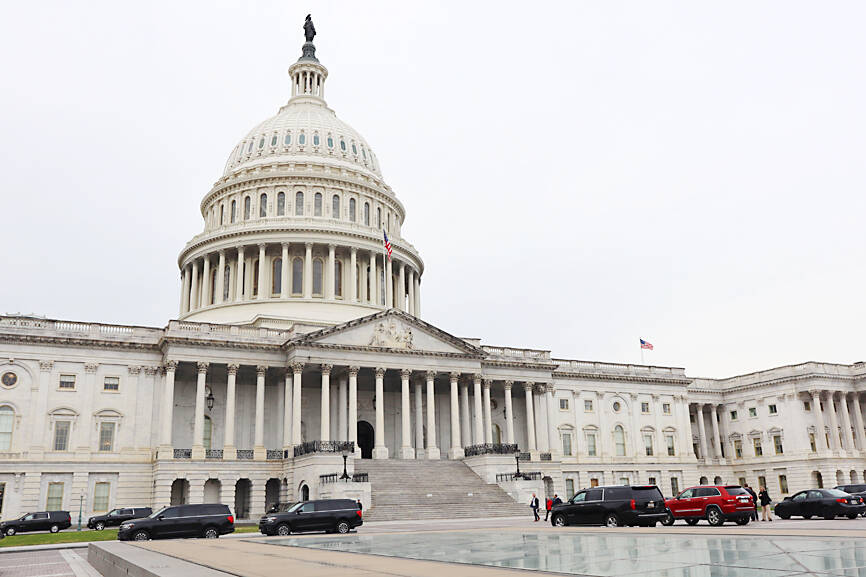The most recent version of the US’ National Defense Authorization Act (NDAA) for Fiscal Year 2025 includes increased support for Taiwan, US House of Representatives Speaker Mike Johnson said yesterday.
Johnson made the remarks at a news conference on Capitol Hill.
The NDAA, published on Saturday, would allow the US departments of defense and state to augment Taiwan’s military capabilities, such as anti-armor, radars, crewed and uncrewed aerial vehicles, cyberdefense, long-range precision weapons, integrated air and missile defense systems, anti-ship missiles, electronic warfare and counter-electronic warfare capabilities, secure communications equipment and other electronic protection systems.

Photo: CNA
The act authorizes a Taiwan Security Cooperation Initiative, modeled after the Ukraine Security Assistance Initiative, to enable Taiwan to maintain sufficient self-defense capabilities consistent with the Taiwan Relations Act. And the lawmakers have proposed military articles and training worth up to US$300 million to support Taiwan in the Act.
In concurrence with the US secretary of state, the secretary of defense may provide Taiwan’s military, government and other agencies with defense articles from the US inventory and services to help the nation maintain sufficient self-defense capabilities, according to the NDAA.
The US is to establish a joint program with Taiwan on general trauma care, amputation and amputee care, and any other mental health condition associated with post-traumatic stress disorder or traumatic brain injuries, it says.
According to Section 1324 of the act, the US Congress can invite Taiwan’s naval forces to participate in next year’s Rim of the Pacific exercise.
According to Section 5121, also known as Building Options for the Lasting Security of Taiwan through European Resolve (BOLSTER) Act, collaborations with the EU and the UK should be pursued on sanctions against the People’s Republic of China (PRC) if it overthrows or dismantles the governing institutions in Taiwan, or occupies any territory controlled or administered by Taiwan.
Imposing a naval blockade or quarantining Taiwan, seizing its outlying islands or initiating a cyberattack that threatens civilian or military infrastructure in the nation are grounds to issue sanctions, according to the BOLSTER Act.
The US president should tender a report to the Senate’s Committee on Foreign Relations and the House of Representatives’ Committee on Foreign Affairs on the expected economic impacts of a Chinese People’s Liberation Army (PLA) 30-day or 180-day blockade or quarantine of Taiwan, according to the NDAA.
The US and European countries should publicly and repeatedly emphasize the differences between their respective “one China” policies and the PRC’s “one China” principle to counter the PRC’s claims that UN Resolution 2758 recognizes the PRC territorial claims to Taiwan, it says.
European countries, particularly those with experience combatting Russian aggression, can provide Taiwan with lessons learned from their defense programs to mobilize the military and civilians in a time of crisis, it says.

AIR SUPPORT: The Ministry of National Defense thanked the US for the delivery, adding that it was an indicator of the White House’s commitment to the Taiwan Relations Act Deputy Minister of National Defense Po Horng-huei (柏鴻輝) and Representative to the US Alexander Yui on Friday attended a delivery ceremony for the first of Taiwan’s long-awaited 66 F-16C/D Block 70 jets at a Lockheed Martin Corp factory in Greenville, South Carolina. “We are so proud to be the global home of the F-16 and to support Taiwan’s air defense capabilities,” US Representative William Timmons wrote on X, alongside a photograph of Taiwanese and US officials at the event. The F-16C/D Block 70 jets Taiwan ordered have the same capabilities as aircraft that had been upgraded to F-16Vs. The batch of Lockheed Martin

GRIDLOCK: The National Fire Agency’s Special Search and Rescue team is on standby to travel to the countries to help out with the rescue effort A powerful earthquake rocked Myanmar and neighboring Thailand yesterday, killing at least three people in Bangkok and burying dozens when a high-rise building under construction collapsed. Footage shared on social media from Myanmar’s second-largest city showed widespread destruction, raising fears that many were trapped under the rubble or killed. The magnitude 7.7 earthquake, with an epicenter near Mandalay in Myanmar, struck at midday and was followed by a strong magnitude 6.4 aftershock. The extent of death, injury and destruction — especially in Myanmar, which is embroiled in a civil war and where information is tightly controlled at the best of times —

China's military today said it began joint army, navy and rocket force exercises around Taiwan to "serve as a stern warning and powerful deterrent against Taiwanese independence," calling President William Lai (賴清德) a "parasite." The exercises come after Lai called Beijing a "foreign hostile force" last month. More than 10 Chinese military ships approached close to Taiwan's 24 nautical mile (44.4km) contiguous zone this morning and Taiwan sent its own warships to respond, two senior Taiwanese officials said. Taiwan has not yet detected any live fire by the Chinese military so far, one of the officials said. The drills took place after US Secretary

THUGGISH BEHAVIOR: Encouraging people to report independence supporters is another intimidation tactic that threatens cross-strait peace, the state department said China setting up an online system for reporting “Taiwanese independence” advocates is an “irresponsible and reprehensible” act, a US government spokesperson said on Friday. “China’s call for private individuals to report on alleged ‘persecution or suppression’ by supposed ‘Taiwan independence henchmen and accomplices’ is irresponsible and reprehensible,” an unnamed US Department of State spokesperson told the Central News Agency in an e-mail. The move is part of Beijing’s “intimidation campaign” against Taiwan and its supporters, and is “threatening free speech around the world, destabilizing the Indo-Pacific region, and deliberately eroding the cross-strait status quo,” the spokesperson said. The Chinese Communist Party’s “threats